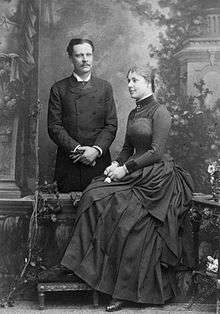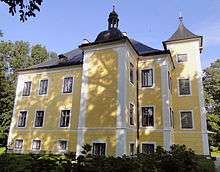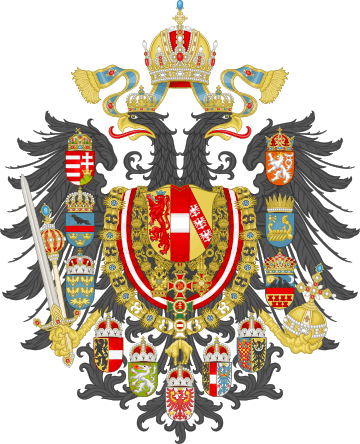Count Manfred von Clary-Aldringen
Count Manfred von Clary-Aldringen (30 May 1852 Palais Mollard-Clary, Vienna – 12 February 1928 Castle Herrnau, Salzburg) was an Austro-Hungarian nobleman and statesman. He served as the 16th Minister-President of Cisleithania (therefore the 28th Minister-President of Austria overall).
Manfred Graf von Clary-und-Aldringen | |
|---|---|
 | |
| 16th Minister-President of the Austrian Empire | |
| In office 2 October 1899 – 21 December 1899 | |
| Monarch | Franz Joseph I of Austria |
| Preceded by | Franz Fürst von Thun und Hohenstein |
| Succeeded by | Heinrich Ritter von Wittek |
| Personal details | |
| Born | 30 May 1852 Palais Mollard-Clary, Vienna, Austro-Hungarian Empire |
| Died | 12 February 1929 (aged 76) Salzburg, Republic of Austria |
| Spouse(s) | Countess Franziska Pejácsevich von Veröcze |
| Alma mater | University of Vienna |
Biography
Family
Born into a prominent Austro-Hungarian princely family of Bohemian origin (the Clary-Aldringens), the son of Fürst (prince) Edmund Moritz and Fürstin (princess) Elisabeth-Alexandrine von Clary-und-Aldringen, (born countess de Ficquelmont). He is the younger brother of Fürst (prince) Siegfried (1848–1929) who was a prominent Austro-Hungarian diplomat and the grandson of count Charles-Louis de Ficquelmont (1777–1857), 2nd Minister-President of the Austrian Empire.
In 1884, he married in Vienna Gräfin (countess) Franziska Pejácsevich von Veröcze, heiress of one of the most powerful family of the Croatian descending from the princes Esterházy von Galántha. The couple had two children.
Political career
Count Clary-und-Aldringen studied Law at the University of Vienna before starting a political career in Imperial Austria. The Austro-Hungarian Empire was dominated by a small circle[1] of high nobility families[2] that had great power and enormous riches and thus played a major role in politics and diplomacy. Count Manfred is the perfect example of such an influence.
On February 22, 1896, he became Governor of the Länder of Austrian-Silesia, a key office in a strategic region for the Empire: not only was the länder rich in natural resources but it also lay at the border with both German and Russian Empires. Austrian-Silesia was heir to a long power struggle between these three empires and at the heart of the nationalistic issues of central European irredentisms.
In 1898, Count Manfred became Governor and representative at the Imperial Austrian Reischrat (Imperial Austrian Council) for the Länder of Styria,[3] an office of major importance he kept until the fall of the Empire in 1918. Styria was one of the powerhouses of the Austro-Hungarian economy, the länder was a center of industries and agricultures, and its capital Graz was one of the Empire's most populous cities.
From October 2 to December 21, 1899, Count Clary-und-Aldringen served as Minister-President of Austria, following in the steps of his grandfather, Count Charles-Louis de Ficquelmont (1777–1857) who succeeded Prince Metternich as the second Minister-President of the Empire in 1848.
Later life

After the fall of the Austro-Hungarian Empire following the defeat of the Central Powers during the autumn of 1918, Count Manfred resigned from all his official offices and spent his remaining years between his estates in Austria and his family's Czech estates (Teplice).
On February 12, 1928 count Manfred von Clary-und-Aldringen died in his Salzburg residence of Schoss Herrnau (Herrnau Castle).
Count Clary und Aldringen is widely seen as a modernizer and has been regarded as both one of the most prominent statesman of the end of the Austro-Hungarian Empire and a symbol of the influence of the Austro-Hungarian high nobility in politics at the turn of the 19th century.
He has also been well known for successfully fighting Tuberculosis when he was President of the Austrian Red Cross in Kronland.
See also
- The House of Clary-Aldringen
- Minister-President of Austria
Notes
- called the 100 Familien (100 families) see Austrian nobility
- see List of princes of Austria-Hungary and List of counts of Austria-Hungary
- "Clary-Aldringen Manfred Graf". In: Österreichisches Biographisches Lexikon 1815–1950 (ÖBL). Vol. 1, Austrian Academy of Sciences, Vienna 1957, p. 149.
Bibliography
- "Clary-Aldringen, Manfred Gf.". In: Österreichisches Biographisches Lexikon 1815–1950 (ÖBL). Vol. 1, Austrian Academy of Sciences, Vienna 1957, p. 149.
- Ableitinger, Alfred: Badeni – Thun – Clary-Aldringen – Eulenburg. Das österreichische Regierungssystem in der Krise der Jahre 1897–1899. In: Gernot Peter Obersteiner (Hrsg.): Festschrift Gerhard Pferschy zum 70. Geburtstag. Historische Landeskommission für Steiermark, Graz 2000, ISBN 3-901251-15-4, S. 327–349.
- Flooh-Wagnes, Elma: Manfred Graf Clary und Aldringen. Der letzte k. k. Statthalter in Steiermark. Sein Leben und Wirken. Graz 1952
